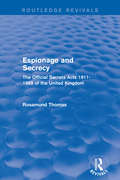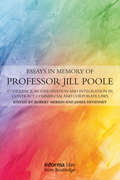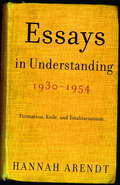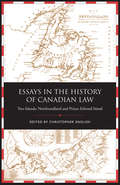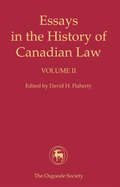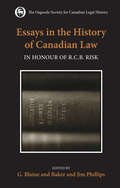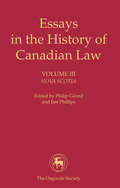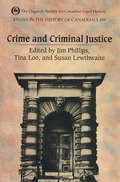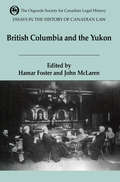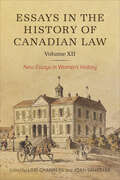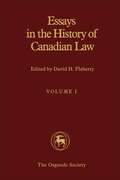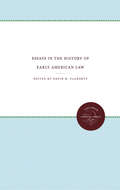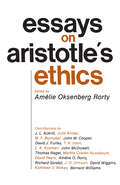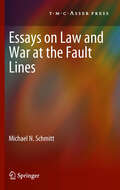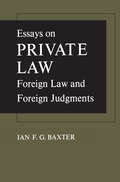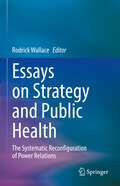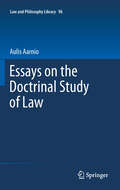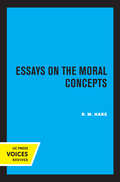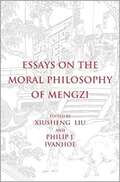- Table View
- List View
Espionage and Secrecy: The Official Secrets Acts 1911-1989 of the United Kingdom (Routledge Revivals)
by Rosamund ThomasThis prize-winning book, first published in 1991, provides a detailed legal account of the development of the UK Official Secrets Acts 1911-1989. In particular, the Espionage section (s.1) of this criminal law is analysed carefully, illustrated by leading cases of UK spies prosecuted under this section, particularly during the 1980’s — including MI5 officer Michael Bettaney and Geoffrey Prime who worked at GCHQ. The author also examines problems of evidence in espionage prosecutions, and the consent of the Attorney-General in cases under the Official Secrets Acts. This book remains the definitive treatise on the UK Official Secrets Acts, especially concerning the espionage provisions.
Essay on Man and Other Poems: And Other Poems (Dover Thrift Editions)
by Alexander PopeConsidered the preeminent verse satirist in English, Alexander Pope (1688-1744) brought wide learning, devastating wit and masterly technique to his poems. Models of clarity and control, they exemplified the classical poetics of the Augustan age.This volume contains a rich selection of Pope's work, including such well-known poems as the title selection — a philosophical meditation on the nature of the universe and man's place in it — and "The Rape of the Lock," a mock-epic of rare charm and skill. Also included are "Ode on Solitude," "The Dying Christian to His Soul," "Elegy to the Memory of an Unfortunate Lady," "An Essay on Criticism," "Epigram Engraved on the Collar of a Dog," "Epistle [IV] to Richard Boyle, Earl of Burlington: Of the Use of Riches," "Epistle to Dr. Arbuthnot; or, Prologue to the Satires" and more.Taken together, these poems offer an excellent sampling of Pope's imaginative genius and the felicitous blending of word, idea and image that earned him a place among the leading lights of 18th-century literature.
Essays in Memory of Professor Jill Poole: Coherence, Modernisation and Integration in Contract, Commercial and Corporate Laws
by James Devenney Robert MerkinThis book is a collection of original, thought-provoking essays on critical issues in contract, commercial and corporate law. It is dedicated to the memory of the late Professor Jill Poole, who inspired so many and made such important contributions to these fields of law. The essays are written by leading practitioners and academics in the field, building on Jill’s work. As such this collection will be of interest and importance to professionals, academics and students in these fields of law. The Professor Jill Poole Educational Fund has been established in memory of Jill. It will be used to support undergraduate students in obtaining 'excellence scholarships' at Aston Law School and to reward 'excellence' at the annual law graduation ceremony. All contributions are welcome, and the royalties from this collection of essays have been donated to it.
Essays in Understanding, 1930-1954
by Hannah ArendtAlthough she herself rejected the title, Hannah Arendt is widely considered one of the foremost political philosophers of her time. This book collects 41 examples of her writings from the first two decades of her career, in exile in Paris in the 1930s and as an émigré to the United States in the 1940s. In the essays, she grapples with the philosophical ideas of Augustine, Kafka, Kierkegaard, Heidegger and others; considers the nature of communism, fascism, and totalitarianism; critiques social science techniques and assumption; and explores the relationship between religion and politics; among other wide-ranging topics. This is a paperbound edition of a work first published in 1994. Annotation ©2006 Book News, Inc. , Portland, OR (booknews. com)
Essays in the History of Canadian Law
by Christopher EnglishThe study of Canadian legal history has seen a remarkable growth in the past decade, nowhere more so than in Atlantic Canada. Given its early settlement and some of the liberties taken with legal procedure there - as well as some creative interpretations of English law - the region is ripe for close study in the legal history field. This new collection examines that history on 'two islands:' Newfoundland and Prince Edward Island.The essays examine legal themes, developments, and disputes, and offer a framework for comparing ways of administering justice through the courts in the eighteenth and nineteenth centuries. The cases examined are particularly interesting for the light they throw on legal process and, especially, on the motives of the parties. Unlike in contemporary England and Upper Canada, the English precedents gave way to local needs as equitable regimes emerged that put family and community interests first, and treated all members of the family in ways tailored to their personal needs and circumstances.This volume, which includes a number of essays examining women's legal status and access to the courts, is a comprehensive and fascinating examination of legal history in two Canadian provinces.
Essays in the History of Canadian Law
by David H. FlahertyThis volume is the second in the Essays in the History of Canadian Law series, designed to illustrate the wide possibilities for research and writing in Canadian legal history. In combination,these volumes reflect the wide-ranging scope of legal history as an intellectual discipline andencourage others to pursue important avenues of inquiry on all aspects of our legal past.Topics include the role of civil courts in Upper Canada; legal education; political corruption;nineteenth-century Canadian rape law; the Toronto Police Court; the Kamloops outlaws and commissions of assize in nineteenth-century British Columbia; private rights and public purposes in Ontario waterways; the origins of workers' compensation in Ontario; and the evolution of the Ontario courts. Contributors include Brendan O'Brien, Peter N. Oliver, William N.T. Wylie, G. Blaine Baker, Paul Romney, Constance B. Backhouse, Paul Craven, Hamar Foster, Jamie Bendickson, R.C.B. Risk, and Margaret A. Banks.
Essays in the History of Canadian Law
by Donald Fyson G. Blaine BakerThe essays in this volume deal with the legal history of the Province of Quebec, Upper and Lower Canada, and the Province of Canada between the British conquest of 1759 and confederation of the British North America colonies in 1867. The backbone of the modern Canadian provinces of Ontario and Quebec, this geographic area was unified politically for more than half of the period under consideration. As such, four of the papers are set in the geographic cradle of modern Quebec, four treat nineteenth-century Ontario, and the remaining four deal with the St. Lawrence and Great Lakes watershed as a whole.The authors come from disciplines as diverse as history, socio-legal studies, women's studies, and law. The majority make substantial use of second-language sources in their essays, which shade into intellectual history, social and family history, regulatory history, and political history.
Essays in the History of Canadian Law
by J. Phillips George Blain BakerThis volume in the Osgoode Society's distinguished series on the history of Canadian law is a tribute to Professor R.C.B. Risk, one of the pioneers of Canadian legal history and for many years regarded as its foremost authority. The fifteen original essays are by notable scholars, some of whom were students of Professor Risk, and represent some of the best and most original work in the area of Canadian legal history. They cover a number of important topics that range from the form of the criminal trial in the eighteenth century, to debates over the meaning of property in the nineteenth, and to lawyer/poet Tom MacInnes's views on the law of aboriginal title in the twentieth century.
Essays in the History of Canadian Law
by John T. Saywell R. Roy Mcmurtry J. PhillipsWritten to honour the life and work of the late Peter N. Oliver, the distinguished historian and editor-in-chief of the Osgoode Society for Canadian Legal History from 1979-2006, this collection assembles the finest legal scholars to reflect on the issues in and development of the field of legal history in Canada.Covering a broad range of topics, this volume examines developments over the last two hundred years in the legal profession and the judiciary, nineteenth-century prison history, as well as the impact of the 1815 Treaty of Paris. The introduction also provides insight into the history of the Osgoode Society and of Oliver's essential role in it, along with an illuminating analysis of the Society's publications program, which produced sixty-six books during his tenure.A fitting tribute to one of the foremost legal historians, this tenth volume of Essays in the History of Canadian Law is a significant contribution to the discipline to which Oliver devoted so much.
Essays in the History of Canadian Law
by J. Phillips Philip GirardThis third volume of Essays in the History of Canadian Law presents thoroughly researched, original essays in Nova Scotian legal history. An introduction by the editors is followed by ten essays grouped into four main areas of study. The first is the legal system as a whole: essays in this section discuss the juridical failure of the Annapolis regime, present a collective biography of the province's superior court judiciary to 1900, and examine the property rights of married women in the nineteenth century. The second section deals with criminal law, exploring vagrancy laws in Halifax in the late nineteenth century, aspects of prisons and punishments before 1880, and female petty crime in Halifax.The third section, on family law, examines the issues of divorce from 1750 to 1890 and child custody from 1866 to 1910. Finally, two essays relate to law and the economy: one examines the Mines Arbitration Act of 1888; the other considers the question of private property and public resources in the context of the administrative control of water in Nova Scotia.
Essays in the History of Canadian Law
by J. Phillips Tina Loo Susan LewthwaiteThis fifth volume in the distinguished series on the history of Canadian law turns to the important issues of crime and criminal justice. In examining crime and criminal law specifically, the volume contributes to the long-standing concern of Canadian historians with law, order, and authority.The volume covers criminal justice history at various times in British Columbia, Ontario, Quebec, and the Maritimes. It is a study which opens up greater vistas of understanding to all those interested in the interstices of law, crime, and punishment.
Essays in the History of Canadian Law Volume VI
by John Mclaren Hamar FosterThis sixth volume in the Osgoode Society's distinguished series on the history of Canadian law turns to the a central theme in the history of British Columbia and the Yukon - law and order. In the early days of British sovereignty, the frenzied activity of the fur trade and the gold rush, along with clashes between settlers and Natives, made law enforcement a difficult business. Later, although law and order were more firmly established, tensions continued between the dominant populations committed to the practice and rhetoric of British justice and those groups owing allegiance to other value systems (such as Native peoples, Asian immigrants, and Doukhobors) or those resisting authority (criminals and the criminally insane). These essays look at key social, economic, and political issues of the times and show how they influenced the developing legal system.The essays cover a wide range of topics, and explore the human as well as the legal dimensions of their subjects, relating specific cases to broader theory. They demonstrate that English law has been flexible enough to accommodate diversity and is, therefore, pragmatic. The volume also proves that there is no single Canadian legal culture: geography, demography, politics, economics, and military considerations have had an impact on the shape of our legal culture. The introduction by John McLaren and Hamar Foster pulls together the many regional themes to provide a clear overview of the legal complexities of the period.
Essays in the History of Canadian Law, Volume XII: New Essays in Women's History (Essays in the History of Canadian Law #XII)
by Lori Chambers Joan SangsterDrawing on engaging case studies, Essays in the History of Canadian Law brings the law to life. The contributors to this collection provide rich historical and social context for each case, unravelling the process of legal decision-making and explaining the impact of the law on the people involved in legal disputes. Examining the law not simply as legislation and institutions, but as discourse, practice, symbols, rhetoric, and language, the book’s chapters show the law as both oppressive and constraining and as a point of contention and means of resistance. This collection presents new approaches and concerns, as well as re-examinations of existing themes with new evidence and modes of storytelling. Contributors cover many legal thematic areas, from criminal to labour, civil, administrative, and human rights law, spanning English and French Canada, and ranging from the mid-eighteenth century to the late twentieth century. The legal cases vary from precedent-setting cases to lesser-known ones, from those driven by one woman’s quest for personal justice to others in which state actors dominate. Bringing to light how the people embroiled in these cases interacted with the legal system, the book reveals the ramifications of a legal system characterized by multiple layers of inequality.
Essays in the History of Canadian Law: Volume I
by David FlahertyThis volume, containing ten essays, is the first of two designed to illustrate the wide possibilities for research and writing in Canadian legal history and reflecting the current interests of those working in that area. Topics covered include historical aspects of company law, the law and the economy, legal reform in Ontario, custody law, the law of master and servant, the law of nuisance, origins of the Canadian Criminal Code, and women's rights in Quebec. Professor Flaherty supplies an introduction to the writing of Canadian legal history and, with his contributors, provides an important building block on which a significant tradition of indigenous legal history in Canada may grow and flourish.
Essays in the History of Early American Law (Published by the Omohundro Institute of Early American History and Culture and the University of North Carolina Press)
by David H. FlahertyThis collection of outstanding essays in the history of early American law is designed to meet the demand for a basic introduction to the literature of colonial and early United States law. Eighteen essays from historical and legal journals by outstanding authorities explore the major themes in American legal history from colonial beginnings to the early nineteenth century.Originally published in 1969.A UNC Press Enduring Edition -- UNC Press Enduring Editions use the latest in digital technology to make available again books from our distinguished backlist that were previously out of print. These editions are published unaltered from the original, and are presented in affordable paperback formats, bringing readers both historical and cultural value.
Essays on Aristotle's Ethics (Philosophical Traditions #2)
by Amélie Oksenberg RortyAristotle's Nicomachean Ethics deals with character and its proper development in the acquisition of thoughtful habits directed toward appropriate ends. The articles in this unique collection, many new or not readily available, form a continuos commentary on the Ethics. Philosophers and classicists alike will welcome them.
Essays on Law and War at the Fault Lines
by Michael N. SchmittThis collection of essays by Professor Michael N. Schmitt of Durham University draws together those of his articles published over the past two decades that have explored particular fault lines in the law of armed conflict. As such, they examine the complex interplay between warfare and law, seeking to identify where the law and warfare appear to diverge, and where such apparent divergence can be accommodated through contextual interpretation of the law. Each essay examines a particular issue in either the jus ad bellum (the law governing resort to force) or jus in bello (international humanitarian law) that has proven contentious in terms of applying extant norms to the evolving face of armed conflict. Among the topics addressed are counter-terrorism, cyber operations, asymmetrical warfare, assassination, environmental warfare and the participation of civilians in hostilities.
Essays on Law, Religion, and Morality
by Gerard V. BradleyThe most controversial foundational issue today in both legal philosophy and constitutional law is the relationship between objective moral norms and the positive law. Is it possible for the state to be morally "neutral" about such matters as marriage, the family, religion, religious liberty, and - as the Supreme Court once famously phrased it - "the meaning of life"? If such neutrality is possible, is it desirable? In this volume of essays one of our country's leading constitutional lawyers answers "no" to both questions. In the first three chapters, Gerard Bradley investigates the central moral justification of punishment, the morality of plea bargaining, and how the criminal justice system should treat the family. These essays reflect both Bradley's decades as a teacher of criminal law as well as his earlier experience as a trial prosecutor in the Manhattan District Attorney's Office. The second triptych of papers has to do with the raging controversy over same-sex "marriage," and the broader movement toward a socially sanctioned orthodoxy about sexual orientation of which the "marriage" movement is one part. These papers reflect the author's years of philosophical work on the marriage question, as well as his more practical experience as a popular debater and expert witness. Finally, Bradley takes up the questions of religious liberty and how our democratic polity should treat religion. These chapters cover the original meaning of the First Amendment's Establishment Clause, the role of Catholicism in the post-World War II controversies over movie censorship as they played out in the Supreme Court, and emerging challenges to religious liberty in the 21st century.
Essays on Private Law: Foreign Law and Foreign Judgments
by Ian F.G. BaxterThis book contains a series of essays on conflict laws, including jurisdiction of the courts, choice of law, renvoi, property, recognition of family status, and recognition of foreign corporations. It is not a text-book, but an analysis and criticism of existing principles with recommendations for reform and for a different approach to the subject. In general, an approach is advocated that will be simpler and less abstract and doctrinaire than at present, and better integrated with the ordinary laws of the forum. The recommendations made could be thought of as principles on which to build a reform of conflict of laws or a model code. The first two chapters deal with jurisdiction and choice of law, two distinct topics, with different considerations of policy, which have not always been kept distinct by judges and text writers. The third chapter considers certain questions of legal interpretation, mainly in the construction of money obligations expressed in a foreign currency. This shows a working out of the problems of contract analysis and interpretation which are dealt with more generally in other chapters. Another chapter discusses property law, a branch of the law which has been influenced, historically, by the doctrine of situs, and the recognition of status in family law and in corporation law. The concluding chapter draws together the main results of the preceding discussion and states from basic principles, one of which is that there is a need "for greater unity between the conflict rules and the general law," and for "allowing, where appropriate, the influence of legal systems other than that of the forum." Professor Baxter's discussion clearly shows that the complexity of current legal theory can lead to unjust rulings in the courts, and his case for greater simplification is argued compellingly.
Essays on Religion and Human Rights
by David LittleThis collection of seminal essays by David Little addresses the subject of human rights in relation to the historical settings in which its language was drafted and adopted. Featuring five original essays, Little articulates his long-standing view that fascist practices before and during World War II vivified the wrongfulness of deliberately inflicting severe pain, injury, and destruction for self-serving purposes and that the human rights corpus, developed in response, was designed to outlaw all practices of arbitrary force. Drawing on the natural rights tradition, the book contends that while there must be an accountable human rights standard, it should nevertheless guarantee wide latitude for the expression and practice of religious and other conscientious beliefs, consistent with outlawing arbitrary force. This book further details the theoretical grounds of the relationship between religion and human rights, and concludes with essays on U. S. policy and the restraint of force in regard to terrorism and to cases like Vietnam, Afghanistan, and Pakistan. With a foreword by John Kelsey, this book stands as a capstone of the work of this influential writer on religion, philosophy, and law.
Essays on Saving, Bequests, Altruism and Life-cycle Planning
by Laurence J. KotlikoffThis collection of essays, coauthored with other distinguished economists, offers new perspectives on saving, intergenerational economic ties, retirement planning, and the distribution of wealth. The book links life-cycle microeconomic behavior to important macroeconomic outcomes, including the roughly 50 percent postwar decline in America's rate of saving and its increasing wealth inequality. The book traces these outcomes to the government's five-decade-long policy of transferring, in the form of annuities, ever larger sums from young savers to old spenders. The book presents new theoretical and empirical analyses of altruism that rule out the possibility that private intergenerational transfers have offset those by the government. While rational life-cycle behavior can explain broad economic outcomes, the book also shows that a significant minority of households fail to make coherent life-cycle saving and insurance decisions. These mistakes are compounded by reliance on conventional financial planning tools, which the book compares with Economic Security Planner (ESPlanner), a new life-cycle financial planning software program. The application of ESPlannerto U. S. data indicates that most Americans approaching retirement age are saving at much lower rates than they should be, given potential major cuts in Social Security benefits.
Essays on Strategy and Public Health: The Systematic Reconfiguration of Power Relations
by Rodrick WallaceThis book is a collection of essays that explore commonalities and contrasts between strategy in armed conflict and strategy in public health. The first part uses the asymptotic limit theorems of information and control theories to study strategy as an exchange of messages between adversaries, in the context of underlying power relations. The ‘messages’ to be exchanged are constructed from an ‘alphabet’ of tactics available to each contender, in a large sense. The second part of the book explores four case histories from this perspective, ranging across agribusiness-generated pandemics, through tuberculosis and COVID-19. The final chapter attempts a strategic synthesis applicable more specifically to public health than to the remarkably – and disturbingly -- close parallel of armed conflict. Taking a unique approach to public health tactics and strategy this volume will be of interest to social epidemiologists, public health economists, public policy scientists, as well as public health researchers and practitioners.
Essays on the Doctrinal Study of Law
by Aulis AarnioEssays on the Doctrinal Study of Law is a summary of the author's 40 years of research in the fields of civil law and the philosophy of law. The main focus is on the two main tasks in the doctrinal study of law: the interpretation and systematisation of legal norms. In this regard, Professor Aarnio deals with the theory of argumentation as well as with its foundations - i.e., with the ontology, epistemology and methodology of legal thinking - and develops the ideas that were first presented in The Rational as Reasonable (Kluwer 1987) in all of these dimensions. The work includes an updated discussion on the writings of Robert Alexy, Jûrgen Habermas, Ronald Dworkin and Alf Ross. A focal point of view concerns the distinction between positivism and non-positivism, in which the core of the criticism focuses on Scandinavian realism.
Essays on the Moral Concepts (New Studies in Practical Philosophy)
by R.M. HareThis title is part of UC Press's Voices Revived program, which commemorates University of California Press’s mission to seek out and cultivate the brightest minds and give them voice, reach, and impact. Drawing on a backlist dating to 1893, Voices Revived makes high-quality, peer-reviewed scholarship accessible once again using print-on-demand technology. This title was originally published in 1972.
Essays on the Moral Philosophy of Mengzi
by Phillip J. Ivanhoe Xiusheng LiuMengzi (Mencius) is known for his sophisticated views on human nature and moral psychology. These essays explore a range of philosophical ideas at the core of his moral philosophy and relate them to both traditional Chinese and current Western philosophical concerns. The introduction provides historical background and philosophical context, and discusses each of the selections alongside Mengzi's work as a whole.
